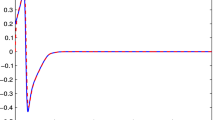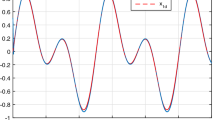Abstract
This work focuses on the design of a sliding mode controller for a class of continuous-time interval type-2 fuzzy-model-based nonlinear systems with unmeasurable state information over a finite-time interval. Aiming at describing the nonlinearities containing parameter uncertainties that inevitably appear in practice, the interval type-2 fuzzy sets are employed to model the studied system. To improve the designing flexibility, a fuzzy observer model non-parallel distribution compensation scheme is designed to estimate the state information of the plant, i.e., the observer is allowed to have a mismatching premise structure from the system. On this basis, the appropriate fuzzy sliding surface and fuzzy controller are constructed by following the same premise variables as the designed fuzzy observer. Then, by means of the sliding mode control theory and the Lyapunov function method, some novel sufficient criteria are established to ensure the finite-time boundedness for the studied systems via a partitioning strategy including the reaching phase, the sliding motion phase and the whole time interval. Furthermore, the designed gains are acquired by solving the matrix convex optimization problem. Finally, the effectiveness of the developed method is demonstrated by two simulation examples.
Similar content being viewed by others
References
Bao L, Fei S, and Yu L, Exponential stability of linear distributed parameter switched systems with time-delay, Journal of Systems Science & Complexity, 2014, 27(2): 263–275.
Zong G D and Zhao H J, Input-to-state stability of switched nonlinear delay systems based on a novel Lyapunov-Krasovskii functional method, Journal of Systems Science & Complexity, 2018, 31(4): 875–888.
Liang H, Liu G, Zhang H, et al., Neural-network-based event-triggered adaptive control of non-affine nonlinear multi-agent systems with dynamic uncertainties, IEEE Trans. Neural Netw. and Learn. Syst., 2021, 32(5): 2239–2250.
Shi K B, Tang Y Y, Liu X Z, et al., Secondary delay-partition approach on robust performance analysis for uncertain time-varying Lurie nonlinear control system, Opt. Control Appl. Methods, 2017, 38(6): 1208–1226.
Shi K B, Tang Y Y, Liu X Z, et al., Non-fragile sampled-data robust synchronization of uncertain delayed chaotic Lurie systems with randomly occurring controller gain fluctuation, ISA Transactions, 2017, 66: 185–199.
Jiao S Y, Xia J W, Wang Z, et al., An improved result on stability analysis of delayed load frequency control power systems, Int. J. Control, Automation and Systems, 2021, 19: 1633–1639.
Wang Y, Chen F, Zhuang G, et al., Dynamic event-based mixed H∞ and dissipative asynchronous control for Markov jump singularly perturbed systems, Appl. Math. Comput., 2020, 386: 125443.
Shen H, Ru T, Xia J, et al., Finite-time energy-to-peak quantized filtering for Markov jump networked systems under weighted try-once-discard protoco, Int. J. Robust & Nonlinear Control, 2021, 31(10): 4951–4964.
Cheng P, He S P, Luan X L, et al., Finite-region asynchronous H∞ control for 2D Markov jump systems, Automatica, 2021, 129: 109590.
Ren C C, He S P, Luan X L, et al., Finite-time L2-gain asynchronous control for continuous-time positive hidden Markov jump systems via T-S fuzzy model approach, IEEE Trans. Cybern., 2021, 51(1): 77–87.
Li Y M, Li K W, and Tong S C, Adaptive neural network finite-time control for multi-input and multi-output nonlinear systems with the powers of odd rational numbers, IEEE Trans. Netw. Learn. Syst., 2020, 31(7): 2532–2543.
Li H, Wang J, Lam H K, et al., Adaptive sliding mode control for interval type-2 fuzzy systems, IEEE Trans. Syst. Man Cybernet. Syst., 2016, 46(12): 1654–1663.
Li H, Shi P, Yao D, et al., Observer-based adaptive sliding mode control for nonlinear Markovian jump systems, Automatica, 2016, 64: 133–142.
Yang Y, Chen F, Lang J, et al., Sliding mode control of persistent dwell-time switched systems with random data dropouts, Appl. Math. Comput., 2021, 400: 126087.
Wang J, Yang Y, Xia J W, et al., Coding-decoding-based sliding mode control for networked persistent dwell-time switched systems, Int. J. Robust & Nonlinear Control, 2021, 31(2): 6055–6068.
Song J, Niu Y, and Zou Y, Finite-time stabilization via sliding mode control, IEEE Trans. Automat. Control, 2017, 62(3): 1478–1483.
Wang J, Ru T, Xia J, et al., Asynchronous event-triggered sliding mode control for semi-Markov jump systems within a finite-time interval, IEEE Trans. Circuits Syst. I, 2021, 68(1): 458–468.
Qi W, Zong G, and Karimi H R, Finite-time observer-based sliding mode control for quantized semi-Markov switching systems with application, IEEE Trans. Industrial Informat., 2020, 16(2): 1259–1271.
Nie R, He S P, Liu F, et al., Sliding mode controller design for conic-type nonlinear semi-Markovian jumping systems of time-delayed Chua’s circuit, IEEE Trans. Syst. Man Cybernet. Syst., 2021, 51(4): 2467–2475.
Li X H, Lu D K, Zhang W, et al., Sensor fault estimation and fault-tolerant control for a class of Takagi-Sugeno M arkovian jump systems with partially unknown transition rates based on the reduced-order observer, Journal of Systems Science & Complexity, 2018, 31(6): 1405–1422.
Xie X P, Zhou Q, Yue D, et al., Relaxed control design of discrete-time Takagi—Sugeno fuzzy systems: An event-triggered real-time scheduling approach, IEEE Trans. Syst. Man Cybernet. Syst., 2018, 48(12): 2251–2262.
Liang H J, Guo X Y, Pan Y N, et al., Event-triggered fuzzy bipartite tracking control for network systems based on distributed reduced-order observers, IEEE Trans. Fuzzy Syst., 2021, 29(6): 1601–1614.
Zhao T and Dian S Y, Fuzzy static output feedback H∞ control for nonlinear systems subject to parameter uncertainties, Journal of Systems Science & Complexity, 2018, 31(2): 343–371.
Tong S C, Min X, and Li Y X, Observer-based adaptive fuzzy tracking control for strict-feedback nonlinear systems with unknown control gain functions, IEEE Trans. Cybern., 2020, 50(9): 3903–3913.
Xia J W, Lian Y X, Su S F, et al., Observer-based event-triggered adaptive fuzzy control for unmeasured stochastic nonlinear systems with unknown control directions, IEEE Trans. Cybern., 2021, DOI: https://doi.org/10.1109/TCYB.2021.3069853.
Xia J W, Chen G L, Park J H, et al., Dissipativity-based sampled-data control for fuzzy switched Markovian jump systems, IEEE Trans. Fuzzy Syst., 2021, 29(6): 1325–1339.
Shi K, Wang J, Zhong S, et al., Non-fragile memory filtering of T-S fuzzy delayed neural networks based on switched fuzzy sampled-data control, Fuzzy Sets Syst., 2020, 394: 40–64.
Wang J, Huang Z G, Wu Z G, et al., Extended dissipative control for singularly perturbed PDT switched systems and its application, IEEE Trans. Circuits Syst. I, Reg. Papers, 2020, 67(12): 5281–5289.
Wang J, Yang C Y, Xia J W, et al., Observer-based sliding mode control for networked fuzzy singularly perturbed systems under weighted try-once-discard protocol, IEEE Trans. Fuzzy Syst., 2021, DOI: https://doi.org/10.1109/TFUZZ.2021.3070125.
Wang X L, Yu Y, Cai J, et al., Dynamic pinning synchronization of fuzzy-dependent-switched coupled memristive neural networks with mismatched dimensions on time scales, IEEE Trans. Fuzzy Syst., 2020, DOI: https://doi.org/10.1109/TFUZZ.2020.3048576.
Wang J, Wang X L, Xie N, et al., Fuzzy-model-based H∞ pinning synchronization for coupled neural networks subject to reaction-diffusion, IEEE Trans. Fuzzy Syst., 2020, DOI: https://doi.org/10.1109/TFUZZ.2020.3036697.
Shi K B, Tang Y Y, Zhong S, et al., Nonfragile asynchronous control for uncertain chaotic Lurie network systems with Bernoulli stochastic process, Int. J. Robust & Nonlinear Control, 2018, 28(5): 1693–1714.
Wang Y, Hu X H, Shi K B, et al., Network-based passive estimation for switched complex dynamical networks under persistent dwell-time with limited signals, J. Franklin Inst., 2020, 357(15): 10921–10936.
Shi K B, Wang J, Tang Y Y, et al., Reliable asynchronous sampled-data filtering of T-S fuzzy uncertain delayed neural networks with stochastic switched topologies, Fuzzy Sets and Sys., 2020, 381: 1–25.
Wang J, Zhang Y G, Su L, et al., Fuzzy-model-based l2-l∞ filtering for discrete-time semi-Markov jump nonlinear systems using semi-Markov kernel, IEEE Trans. Fuzzy Syst., 2021, DOI: https://doi.org/10.1109/TFUZZ.2021.3078832.
Wang J, Xia J W, Shen H, et al., Synchronization for fuzzy Markov jump chaotic systems with piecewise-constant transition probabilities subject to PDT switching rule, IEEE Trans. Fuzzy Syst., 2020, DOI: https://doi.org/10.1109/TFUZZ.2020.3012761.
Shen H, Dai M, Luo Y, et al., Fault-tolerant fuzzy control for semi-Markov jump nonlinear systems subject to incomplete SMK and actuator failures, IEEE Trans. Fuzzy Syst., 2020, DOI: https://doi.org/10.1109/TFUZZ.2020.3011760.
Xie W, Zeng Y, Shi K, et al., Hybrid event-triggered filtering for nonlinear Markov jump systems with stochastic cyber-attacks, IEEE Access, 2020, 381: 40–64.
Lam H K and Seneviratne L D, Stability analysis of interval type-2 fuzzy-model-based control systems, IEEE Trans. Syst. Man Cybernet. Part B, 2008, 38(3): 617–628.
Li H, Yin S, Pan Y, et al., Model reduction for interval type-2 Takagi-Sugeno fuzzy systems, Automatica, 2015, 61: 308–314.
Liu X, Xia J, Wang J, et al., Interval type-2 fuzzy passive filtering for nonlinear singularly perturbed PDT-switched systems and its application, Journal of Systems Science & Complexity, 2021, 34(6): 2195–2218.
Kavikumar R, Sakthivel R, Kwon O, et al., Finite-time boundedness of interval type-2 fuzzy systems with time delay and actuator faults, J. Franklin Inst., 2019, 356(15): 8296–8324.
Jiang B, Karimi H R, Kao Y, et al., Takagi-Sugeno model-based sliding mode observer design for finite-time synthesis of semi-Markovian jump systems, IEEE Trans. Syst. Man Cybernet. Syst., 2019, 49(7): 1505–1515.
Zhang Z, Niu Y, Karimi H R, Sliding mode control of interval type-2 fuzzy systems under roundrobin scheduling protocol, IEEE Trans. Syst. Man Cybernet. Syst., 2019, DOI: https://doi.org/10.1109/TSMC.2019.2956714.
Zhang Z, Niu Y, and Song J, Input-to-state stabilization of interval type-2 fuzzy systems subject to cyberattacks: An observer-based adaptive sliding mode approach, IEEE Trans. Fuzzy Syst., 2020, 28(1): 190–203.
Peng C, Ma S, and Xie X, Observer-based non-PDC control for networked T-S fuzzy systems with an event-triggered communication, IEEE Trans. Cybern., 2017, 47(8): 2279–2287.
Xue M, Tang Y, Wu L, et al., Switching stabilization for type-2 fuzzy systems with network-induced packet losses, IEEE Trans. Cybern., 2019, 49(7): 2591–2604.
Cao Z, Niu Y, and Song J, Finite-time sliding-mode control of Markovian jump cyber-physical systems against randomly occurring injection attacks, IEEE Trans. Automat. Control, 2020, 65(3): 1264–1271.
Liu Y, Guo B Z, Park J H, et al., Nonfragile exponential synchronization of delayed complex dynamical networks with memory sampled-data control, IEEE Trans. Neural Netw. and Learn. Syst., 2018, 29(1): 118–128.
Wang D, Chen F, Meng B, et al., Event-based secure H∞ load frequency control for delayed power systems subject to deception attacks, Appl. Math. Comput., 2021, 394: 125788.
Wang J, Liu X, Xia J, et al., Quantized interval type-2 fuzzy control for persistent dwell-time switched nonlinear systems with singular perturbations, IEEE Trans. Cybern., 2021, DOI: https://doi.org/10.1109/TCYB.2021.3049459.
Author information
Authors and Affiliations
Corresponding author
Additional information
This research was supported by the National Natural Science Foundation of China under Grant Nos. 61873002, 62173001.
Rights and permissions
About this article
Cite this article
Liu, Y., Xia, J., Wang, J. et al. Finite-Time Stability for Interval Type-2 Fuzzy Nonlinear Systems via an Observer-Based Sliding Mode Control. J Syst Sci Complex 35, 2223–2247 (2022). https://doi.org/10.1007/s11424-022-1106-8
Received:
Revised:
Published:
Issue Date:
DOI: https://doi.org/10.1007/s11424-022-1106-8




